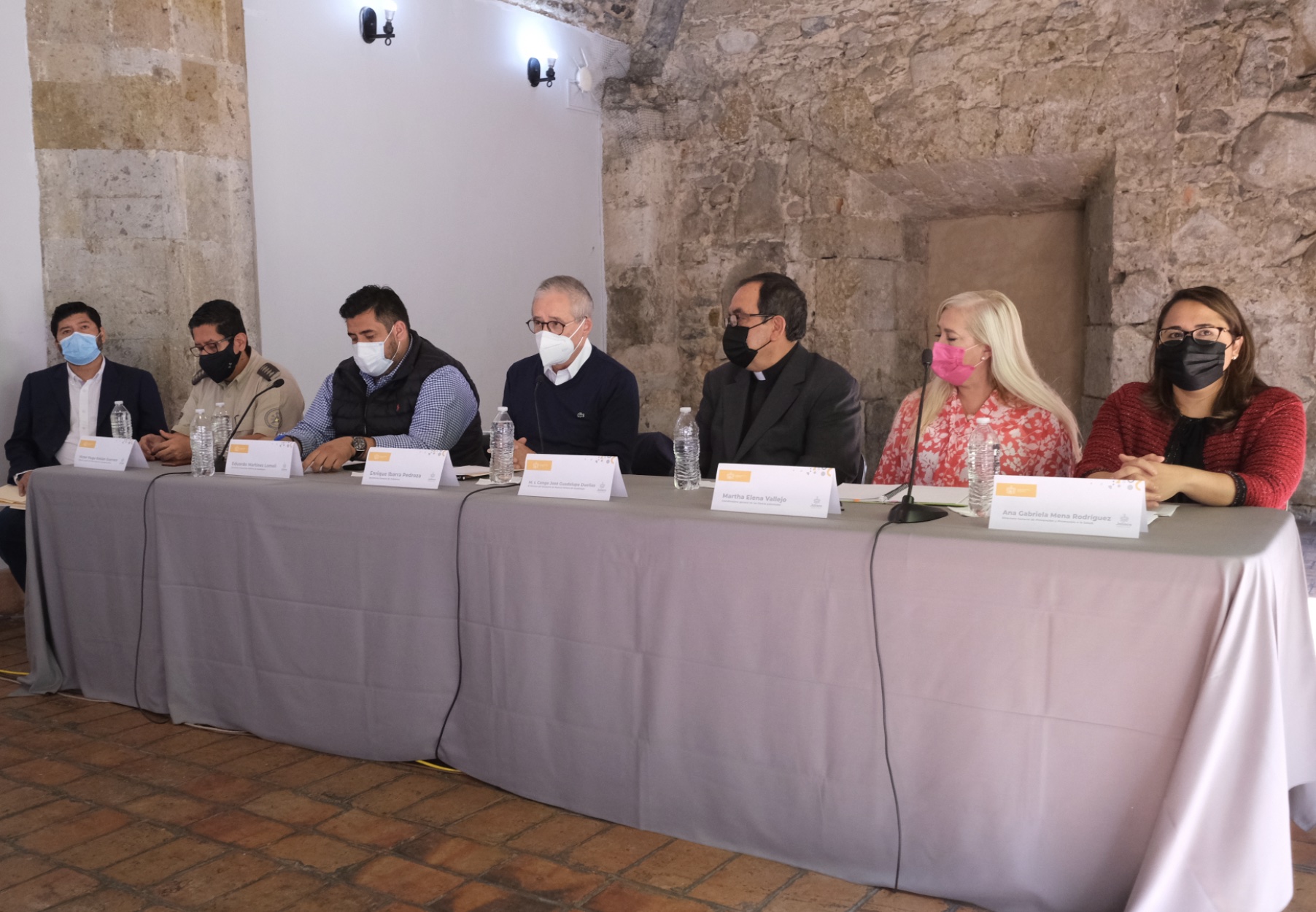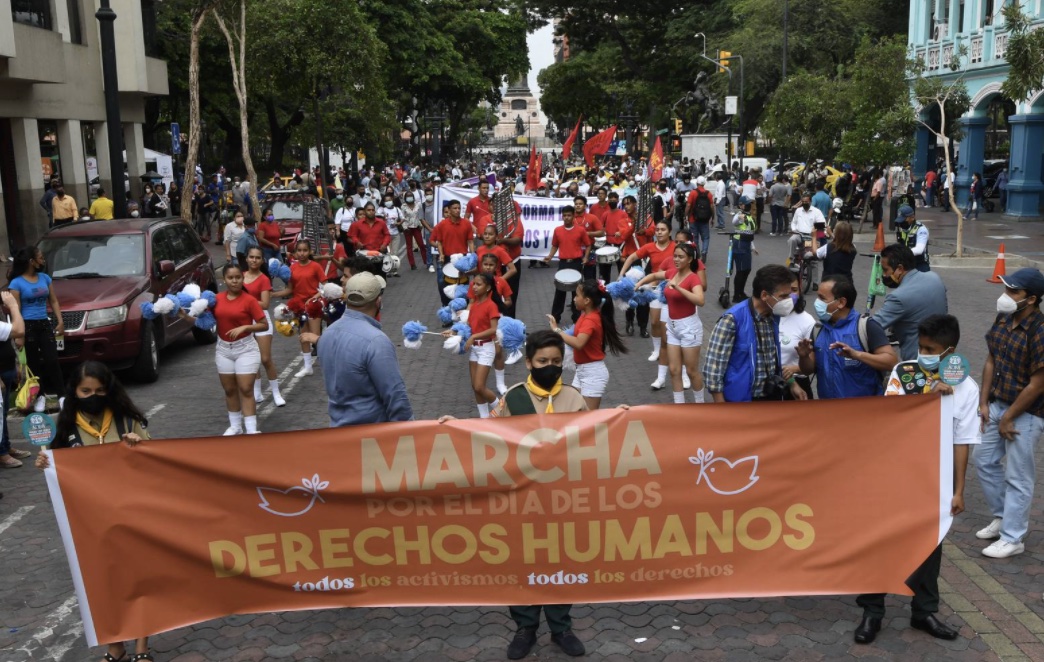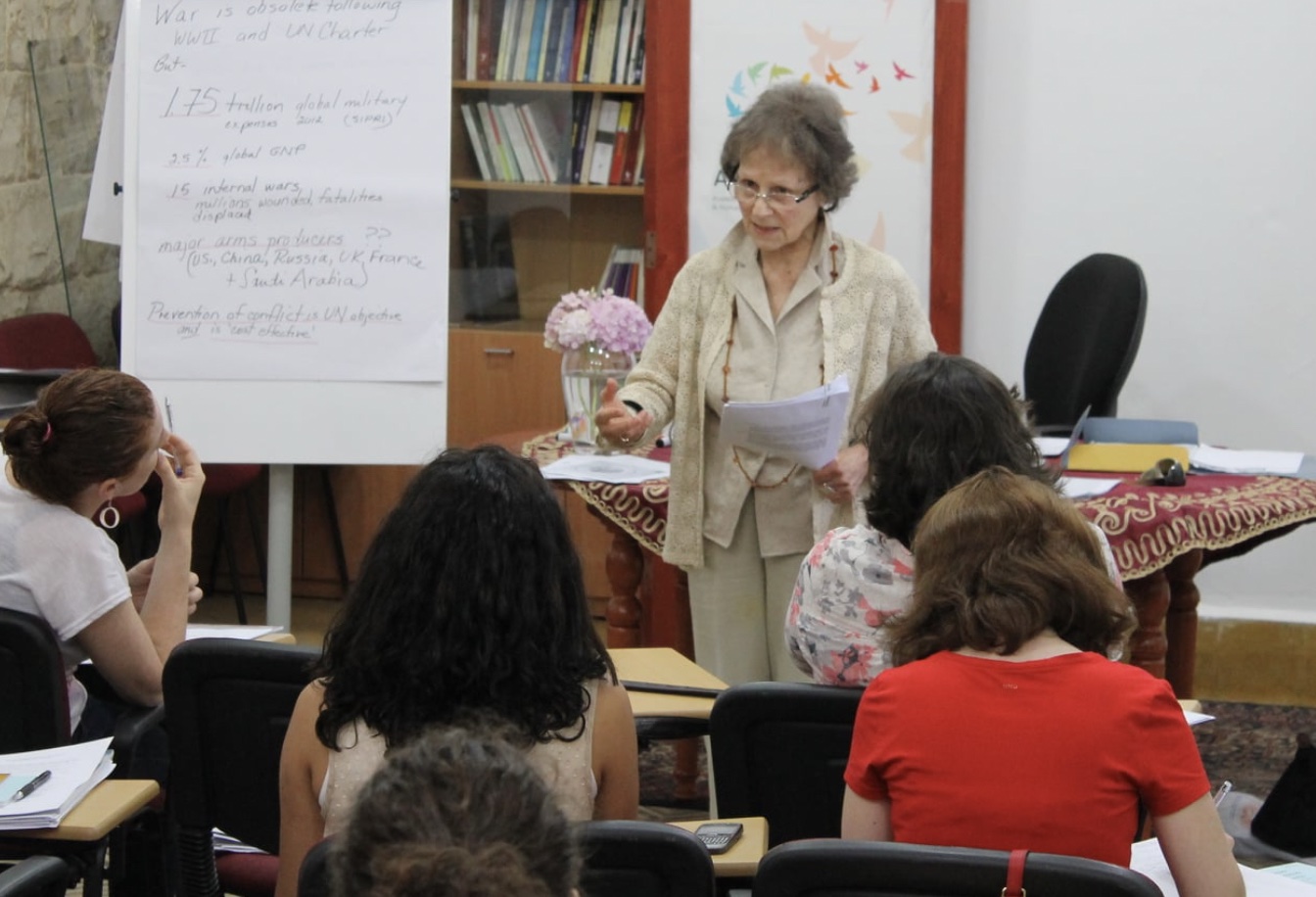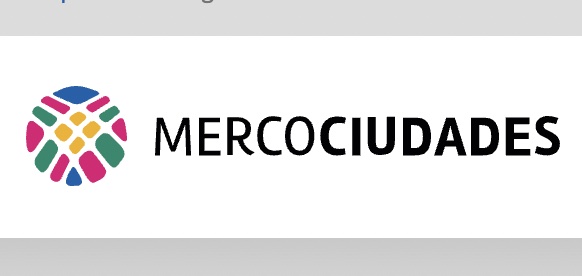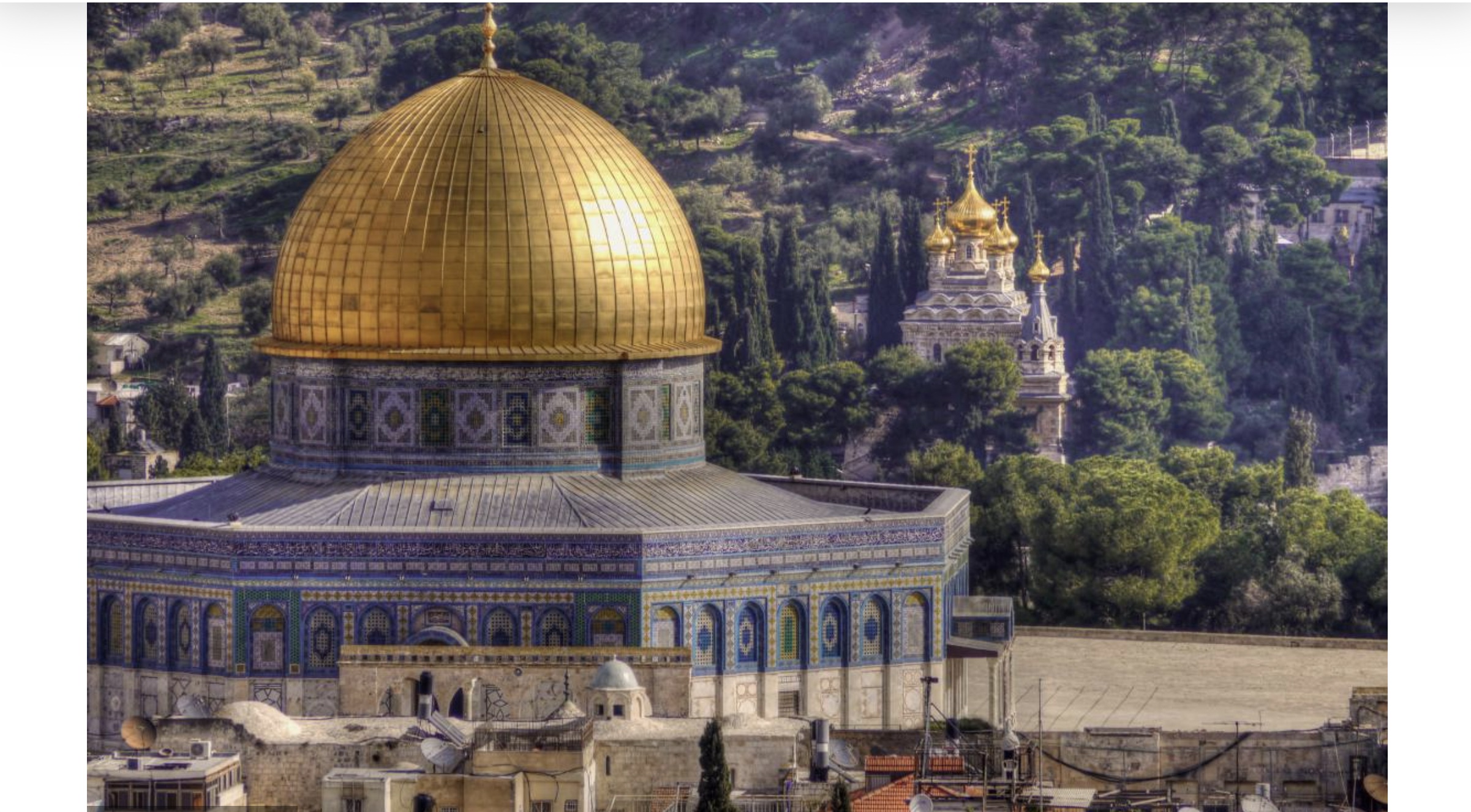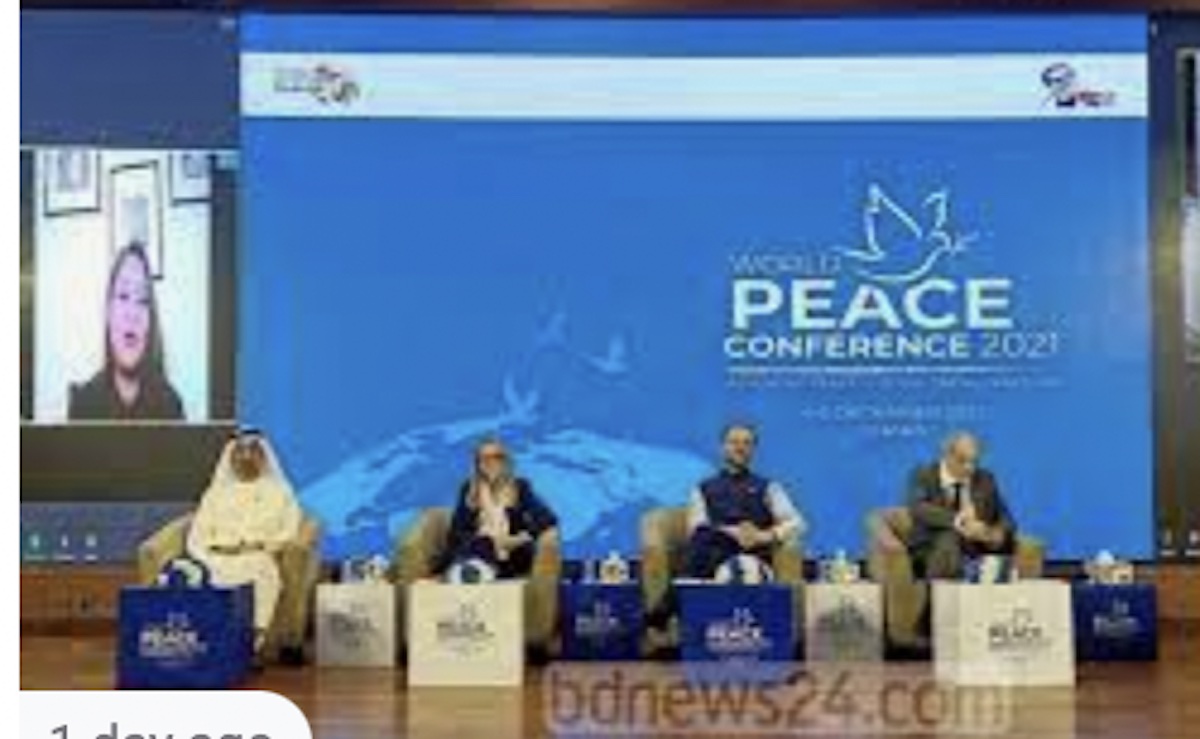DISARMAMENT AND SECURITY .
Including sections on culture of peace from UN press reports of December 6 and December 9.
The annual culture of peace resolution, “Follow-up to the Declaration and Programme of Action on a Culture of Peace”, was adopted on December 9 by the UN General Assembly. As of December 22, the adopted resolution was put here on the UN website.
There was only one substantive change in the operative paragraphs compared to last year’s resolution. It was the following: 11. Emphasizes the critical importance of an inclusive, resilient and sustainable recovery from the COVID-19 pandemic, and in this regard calls upon States to promote the values of culture of peace, inter alia, in countering rising inequalities, discrimination, exclusion, hate crimes and violence;
The United Staters was not among the final 109 co-sponsors of this resolution, and while the European Union did not sponsor as a whole, this year there were several EU members that co-sponsored, including Austria, Bulgaria, Greece, Hungary, and Spain.

Here is the verbatim record of the culture of peace debate on December 6
Culture of Peace
The Assembly then turned to the Secretary‑General’s report titled “Promotion of a culture of peace and interreligious and intercultural dialogue, understanding and cooperation for peace” (document A/76/357) and two related draft resolutions.
RABAB FATIMA (Bangladesh), introducing the draft resolution titled “Follow‑up to the Declaration and Programme of Action on a Culture of Peace” (document A/76/L.19), said the text’s adoption this year assumes greater relevance and urgency as the world continues to grapple with the COVID‑19 pandemic. In addition to technical updates, three new paragraphs — preambular paragraphs 13 and 31 and operative paragraph 11 — are included to reflect the realities of the pandemic and other important developments. The new operative paragraph 11 calls upon States to promote the values of a culture of peace for an inclusive, resilient and sustainable recovery from the COVID‑19 pandemic.
By its terms, the Assembly encouraged Member States, United Nations entities, regional and subregional organizations to consider instituting mechanisms involving youth in promoting a culture of peace, tolerance and intercultural and interreligious dialogue and developing an understanding of respect for human dignity, pluralism and diversity that could discourage their participation in acts of terrorism, violent extremism, xenophobia and discrimination.
It also urged the authorities to provide age‑appropriate education in children’s schools that builds on a culture of peace and non‑violence, including lessons in mutual understanding, respect, tolerance, active and global citizenship, and human rights.
ENRIQUE AUSTRIA MANALO (Philippines) introduced the second draft resolution titled “Promotion of interreligious and intercultural dialogue, understanding and cooperation for peace” (document A/76/L.21). He joined the representative of Pakistan in pointing out the text’s two core objectives: to promote interreligious and intercultural dialogue in achieving peace and stability and the full realization of the 2030 Agenda for Sustainable Development, and to strengthen mechanisms and action for the promotion of a genuine, constructive dialogue across cultural and religious divides. He called on States to further those aims by maintaining an open, inclusive and transparent approach throughout the negotiations process.
Noting a growing trend of xenophobia and religious intolerance, underpinned by the politics of identity, as well as the emergence of extremist ideologies in different parts of the world, especially under a continuing pandemic context, he underlined the important role of UNESCO and the United Nations Alliance of Civilizations in promoting interreligious and intercultural dialogue at the national, regional and international levels, and requested all States to adopt the draft resolution by consensus.
By the text, the Assembly called on Member States, which have the primary responsibility to counter discrimination and hate speech, and all relevant actors, including political and religious leaders, to promote inclusion and unity in response to the COVID‑19 pandemic and to combat racism, xenophobia, hate speech, violence, and discrimination.
It further invited Member States to promote reconciliation to help ensure durable peace, and sustained development, including by working with faith leaders and communities as well as through reconciliatory measures, acts of service and by encouraging forgiveness and compassion among individuals. And it invited Member States to disseminate values of religious tolerance and interreligious dialogue through educational programmes.
NOOR QAMAR SULAIMAN (Brunei Darussalam), speaking on behalf of the Association of Southeast Asian Nations (ASEAN), highlighted that the region is one of the most diverse in the world, with more than 640 million people representing different political, economic, ethnicities and social systems. Guided by the ASEAN Charter, the Association has continued to promote a culture of peace, fostering a caring, cohesive and equitable community. It has initiated several frameworks to promote cooperation and confidence‑building, she said, citing the Treaty of Amity and Cooperation in Southeast Asia, the Treaty on the Southeast Asia Nuclear Weapon‑Free Zone and other ASEAN‑led mechanisms. In 2017, ASEAN leaders adopted the Declaration on Culture of Prevention for a Peaceful, Inclusive, Resilient, Healthy and Harmonious Society, promoting six key priorities.
In March, the fourth meeting of the ASEAN Working Group on Culture of Prevention addressed post‑pandemic recovery efforts, and challenges that hinder peace, security and sustainable developments in the region, she said. She further noted the adoption of the ASEAN Leaders’ Declaration on Upholding Multilateralism, upholding and promoting multilateral cooperation, anchored in international law. ASEAN is committed to the Plan of Action to implement the Joint Declaration on Comprehensive Partnership between ASEAN and the United Nations for 2021-2025, to continue upholding multilateralism and cooperation in evolving regional architecture, as well as promoting sustainable and inclusive peace and stability in the region and beyond. Emphasizing the invaluable role of the Alliance of Civilizations in advancing intercultural and interreligious dialogue, understanding and respect among civilizations, cultures and religions, she recognized its work in coordinating the United Nations Plan of Action to Safeguard Religious Sites. ASEAN will continue to support the Security Council’s women, peace and security agenda, as well as its youth, peace and security agenda.
THILMEEZA HUSSAIN (Maldives) said peace is not a goal achievable on its own, but one that is built on such foundations as a healthy environment and adequate health care and housing. At the multilateral level, States must use such foundational institutions as the United Nations to resolve differences before they become disputes. Citing a range of challenges, she said the pandemic has laid bare the international financial system’s inadequacies, and support must reach those most in need to ensure the maintenance of a culture of peace. Climate change poses a significant threat to small island developing States, undermining their efforts to realize the Sustainable Development Goals. More must be done urgently in this regard. The Declaration and Programme of Action on a Culture of Peace rightly identifies Governments, civil society, media and individuals as key actors for their effective implementation. In this vein, peace requires inclusive and thoughtful engagement between all stakeholders, and only through open dialogue can they build a shared purpose and understanding.
EGRISELDA ARACELY GONZÁLEZ LÓPEZ (El Salvador) expressed concern about the pandemic’s effect on realization of the Sustainable Development Goals and human rights, stressing that greater solidarity is the only way to recover from the crisis, and supporting the call of the World Health Organization (WHO) for better access to vaccines, which would prevent the resurgence of COVID‑19 variants. She also noted the importance of aid to bridge the digital divide, with the support of the United Nations, to ensure equitable access to inclusive education. She also described national policies to support early childhood education to promote a culture of peace and build resilience.
SAMUEL MONCADA (Venezuela) stated that his country has faced difficulties in recent years as a result of a campaign of aggression, based on the illegal application of unilateral coercive measures that have threatened national peace and stability. These criminal actions, which have intensified amid the worst pandemic humanity has faced in the last 100 years, are part of a policy of calculated cruelty, he said. To consciously deprive an entire nation of its means of subsistence is an attack against peace and a crime against humanity. He reaffirmed his support for the implementation of the Declaration and Programme of Action, as well as the continuity of its annual resolution before the Assembly.
OMAR HILALE (Morocco), noting that the COVID‑19 pandemic demonstrated the importance of promoting a culture of peace to overcome gaps in society, welcomed the Secretary‑General’s efforts to make the United Nations the centre of multilateral efforts to fight the pandemic. Religious leaders have an important role to play in overcoming the challenges posed by COVID-19, he said, spotlighting the Secretary‑General’s organization of a meeting of senior religious leaders in May 2020 to address the pandemic. Morocco supports United Nations efforts to promote peace between religions and cultures; it works on the national level towards this end and in the fight against all forms of xenophobia, discrimination, and hatred. A melting pot of different cultures, Morocco is proud to have an ancestral tradition of tolerance and peaceful coexistence. Respect for cultural and religious diversity is part of the country’s collective consciousness. He also stressed the importance of education, which is a key to ensuring the development of a culture of peace and to countering discrimination, hatred and extremism.
SHEIKH GHAZALI (Malaysia), stressing that exclusion and inequality breed instability, consume peace and disrupt sustainable development, noted that his country recently introduced the concept of Keluarga Malaysia or “Malaysian Family” to further strengthen the ethos of togetherness and inclusivity. Malaysia takes an affirmative and positive approach to peace, he said, stressing that peace lies with mutual understanding, respect and tolerance among religions, cultures and peoples. Building a culture of peace is premised on equality and inclusivity such as in ensuring that people have access to food, shelter, education and decent work, he emphasized, calling on States to ensure that the right to development is pursued and realized at the national, regional and global levels. Defamation of religion constitutes a derogation of the right to one’s own beliefs and it is not mutually exclusive with freedom of speech and opinion, he said, underscoring that both rights must be promoted and respected in a compatible, balanced manner.
MARITZA CHAN VALVERDE (Costa Rica) said that the culture of peace teaches that “conflicts are resolved at the negotiating table, not on the battlefield”. Peace is always an unfinished task — “a horizon in motion” — and cannot by imposed by the barrel of a gun. Pointing out that global military spending increased by $2 trillion in 2020, she said that, as more weapons are produced, more will escape the international community’s best efforts to manage and control them. If a fraction of military expenditure was instead used to combat the COVID‑19 pandemic, tackle the climate crisis or bolster implementation of the Sustainable Development Goals, the current generation could take pride in these achievements. Unfortunately, this has not been the case, and promises made concerning the Goals continue to fall short. Against that backdrop, she called on all States to reduce military spending and to consider how gender norms, including “militarized masculinity”, affect conflict and armed violence. Peace is not sustainable if it is not inclusive, and women and girls are underrepresented both in the pandemic response and in other forums that make decisions pertaining to peace and security.
MOHAMED AL HASSAN (Oman), highlighting the urgent need for renewed cooperation to counter hate speech, Islamophobia, contempt of religion, misinformation, and extremist narratives, said that dialogue and cooperation are tools that build bridges for peace and reconciliation. With peace, dialogue and understanding, people can work together to tackle climate change, the digital gap and COVID‑19. Peace is a key component in Omar’s foreign policy, he said, adding that his country seeks to achieve peace in its relations with all countries. Peace cannot be achieved with words, but with actions and conduct in accordance with international values principles and norms consistent with the United Nations Charter.
MOHAMMAD AAMIR KHAN (Pakistan) said that while globalization has brought people closer, it has also spawned divisions and friction among and within societies. Due to a lack of understanding, extremist and terrorist groups have exploited the gap in understanding and tolerance to propagate such divisions. Therefore, it is imperative to strengthen mechanisms that promote dialogue and understanding. Noting the increase in Islamophobia in many parts of the world, he stressed that Islam is a religion of peace and should not be judged by the acts of extremists who exist in all societies. Thus, the international community must effectively address unresolved disputes and conflicts, lack of inclusive socioeconomic development, and anti-migrant rhetoric. To Pakistan, respecting and promoting freedom of religion and belief is not only a duty to its citizens, but also a way of life. His country is building a welfare State that looks after its poor and needy and aims to reduce inequality by investing in human development. It also seeks to build relations with its neighbours and others in the international community, he said, noting the opening of the Kartarpur corridor between India and Pakistan in 2019.
SHEIKHA ALMAHA MUBARAK F. J. AL-THANI (Qatar) said that her country has established institutions for the promotion of a culture of peace and intercultural and interreligious dialogues such as the Doha International Center for Interfaith Dialogue and the Arab Cultural House in Berlin. Given the importance of education in enhancing a culture of peace, Qatar has placed education as a top priority in all its relief and development programmes. Noting the important role of youth in achieving peace and sustainability, she said Qatar will host in January 2022 the International Conference on Comprehensive Peace Paths for Youth, to be held virtually due to COVID‑19. As well, Qatar will host FIFA [World Cup of the Fédération Internationale de Football Association] in 2022, the first time it will be held in the Middle East and the Arab region.
ANDRÉS EFREN MONTALVO SOSA (Ecuador) said dialogue is the best instrument for prevention of violence and conflict. Noting the negative impact of COVID‑19 on different spheres of society, he stressed the need for access to free, reliable multilingual and science-based information to stop the virus’ spread. While a culture of peace is entrenched in Ecuador’s laws, the threat of violence from transnational organized crime could undermine the country’s democratic institutions. Noting that the 2030 Agenda stresses the promotion of a culture of peace, he stressed the need to employ COVID‑19 recovery strategies to achieve the Sustainable Development Goals.
(continued in right column)
Question for this article:
What is the United Nations doing for a culture of peace?
(continued from left column)
SHAUN LIM (Singapore), associating himself with ASEAN, noted Singapore is a diverse society of 5.7 million people — Chinese, Malays, Indians, Eurasians and others — living together on an island smaller than New York City, representing many of the world’s great religions. In a 2019 Gallup poll, 95 per cent of respondents said the country was “a good place to live” for racial and ethnic minorities. However, he noted that the country’s current harmony is built on painful lessons drawn from racial riots during the early years of independence and remains a work in progress. The Declaration on a Culture of Peace affirms the key roles of civil society and religious bodies in developing such a culture, he said, with ground-up organizations and people of faith playing the largest role in building mutual understanding and trust. As such, his Government works closely with the Inter-Religious Organization, led by a council of 31 leaders of 10 different faiths, building networks among them, countering religious extremism and radicalization, and promoting local and international interfaith dialogue.
FAISAL GH A. T. M. ALENEZI (Kuwait) said COVID‑19 has set back communication and dialogue between peoples, resulting in divisions. Instead of ideas coming together, this also risks increasing intolerance and discrimination on racial and ethnic grounds. In that regard, the international community must redouble its efforts to work together against the crisis. Noting that Kuwait has made peace a State objective, he said dialogue, acceptance of others, tolerance are principles and values of Kuwaiti society and have been for centuries. In the modern age, Kuwait’s Constitution has ensured freedom of expression and religious practices. In its efforts to reinforce peace and tolerance, Kuwait created a high-level committee to strengthen tolerance and counter extremist actions and ideas. It also participates in regional and international efforts to strengthen a culture of peace and dialogue.
PEDRO LUIS PEDROSO CUESTA (Cuba) said that while the Assembly meets to discuss peace, the use of force in international relations continues. At same time, unilateral measures prevail even amid the most challenging conditions imposed by COVID‑19. The implementation of unilateral measures impedes the exercise of the right to development of countries. There can be no peace without inclusive social and economic development and as long as inequalities arise from an unjust economic order. Moreover, there can be no peace if hate speech, racism, xenophobia and intolerance continue to be encouraged. Haiti is committed to a culture of peace and to the promotion of Latin America and the Caribbean as a zone of peace. He said the impacts of the most protracted economic, commercial and financial blockade imposed against any country have intensified during the pandemic. As a country of peace, he said Cuba will not yield to attempts to sow confusion or discredit his country.
ASHISH SHARMA (India) said every one of the world’s major religions has a home in India, noting that his country has regularly provided refuge to those who have been persecuted in foreign lands and allowed them to thrive. Noting disconcerting trends and instances of acts of violence based on religion or belief, in particular violence against the Hindu, Buddhist and Sikh communities, he urged the United Nations and Member States to counter such violence immediately. He called for strengthened international efforts to foster and promote a culture of peace. Noting that intolerance, violence and hatred have almost become the norm, he expressed concern about the increase in resources made available to groups who promote such acts. Reiterating the call to fight against violence and discrimination, he said the international community must together build a culture of peace rather than fail separately.
Mr. BONCOEUR (Haiti), noting that the culture of peace, due to its complexity, requires much more commitment and greater involvement of stakeholders, encouraged Member States, United Nations entities, regional organizations and stakeholders to do more to promote peacebuilding and sustain peace. Education and dialogue are the most effective ways to develop a sense of universal values required for coexistence and lasting peace. In the context of growing insecurity, violence, racism, inequality and hate speech, global solidarity is becoming more necessary than ever. In this regard, he called for support for all initiatives to promote a culture of peace and to join the efforts of the United Nations to promote dialogue, understanding and cooperation among religions and cultures in the service of peace. Recalling the late Pope Paul VI and his speech before the United Nations on 4 October 1965, he reminded the Assembly of the important mission of the United Nations to teach peace. “Let us make sure that we live up to this great and noble task,” he said.
Here is the verbatim record of the culture of peace debate on December 9.
Culture of Peace
The Assembly began the meeting by resuming its debate on the culture of peace and considering two draft resolutions on this agenda item. (For background, please see Press Release GA/12392 of 6 December).
MOHAMED OMAR ELFAROUK HASSAN MOHAMED (Egypt) said that the scale of the international transformation could have been an opportunity to create a culture of peace, which should promote living together and tolerance, but technology has contributed to an increase in violence, aggravated by the pandemic, with serious consequences. Optimism about vaccines and the effectiveness of the COVAX facility has dissipated in the face of inequalities in vaccine access. He encouraged intellectuals and the media to play their role in fighting against hatred, ignorance and exclusion and in opposing extremism. Deploring that social networks participate in the recruitment of terrorists using false religious pretexts, he recalled Egypt’s strong commitment to the culture of peace, both at the regional level and in its work with the United Nations.
WAEL AL KHALIL (Syria) said that a culture of peace cannot be maintained without respect for international law. However, the major challenge to the implementation of a culture of peace is that some States attempt to dominate the Organization by putting its mechanisms at the service of their own interests while hiding practices that ignore the purposes of the Charter of the United Nations. Collective will is needed to establish dialogue and cooperative action and put an end to hegemonic policies. The international community must move from words to deeds, he said, emphasizing the need to combat the recent proliferation of extremist policies, the undermining of religions, xenophobia and ignoring the plight of refugees and migrants.
KHAULA ALI KHAMIS OBAID ALSHAMSI (United Arab Emirates), stressing that a culture of peace is essential for combating violence and conflict, noted that the COVID‑19 pandemic has been a test for the international community, regardless of borders. Highlighting her country’s fiftieth anniversary, she reaffirmed its commitment to be a haven of tolerance and coexistence, as well as a beacon of well-being and peace. Drawing attention to the noble values held in common by the entire world and advocated by all religions over the centuries, she said the Emirates involves all parts of society, notably the most vulnerable, in all aspects of life at the national, regional and international levels. Also pointing to the “Global Alliance for Tolerance” initiative, launched by her country in the context of its 2020 Expo, she recalled the Assembly resolution on the International Day of Human Fraternity, which was sponsored by the United Arab Emirates, Bahrain, Saudi Arabia and Egypt.
ZAKIA IGHIL (Algeria) said global solidarity and multilateral cooperation have emerged as crucial components of moving forward in the COVID‑19 recovery. However, while the recovery efforts from the pandemic are ongoing, the unequal access to the vaccines undermines the efforts to end the pandemic globally. Moreover, inequality, poverty, hunger and unemployment are widening. Racism, hate speech and extremism are also on the rise. Concrete actions are needed to realize the culture of peace by addressing the root causes of conflicts, including through decolonialization, combating violent extremism, eradicating poverty and fostering the rule of law, she asserted. On promoting dialogue, Algeria has been a mediator for the conflict in Mali, leading to the signing of the peace agreement and national reconciliation in that country. Algeria has also worked to launch and promote the inter‑Libyan dialogue, with a view toward a peaceful settlement of disputes in the region, she underscored.
JUAN MARCELO ZAMBRANA TORRELIO (Bolivia) said the Organization has a founding mandate to bring about a culture of peace. This mandate is now linked to other concepts such as sustainable development and greater equality between women and men. One of the goals of “Transforming our world: the 2030 Agenda for Sustainable Development” is to bring about a peaceful society without violence. The world has been artificially divided and conflict and intolerance are worsening. He expressed concern about increasing tensions due to the COVID‑19 pandemic and climate change crises, which have had a major humanitarian cost. Bolivia has opted for a culture of peace and a culture of dialogue and diplomacy between nations to bring about peace. Peace can be brought about if there is equality for everyone. Yet intolerance has worsened in the pandemic era, he said, stressing the need for equal, universal access to vaccines. The international community must keep working together to foster a revitalized and inclusive multilateralism.
Speaking in explanation of position before the vote, the representative of Armenia said that the draft resolution concerning promotion of interreligious and intercultural dialogue has many valuable provisions, but preambular paragraph 35 refers to an event held in a Member State with a long‑standing record of gross violations of human rights. Noting that in 2020, amid an unprecedented global pandemic, Azerbaijan launched an aggressive war, that was accompanied by intentional destruction and desecration of the Armenian Christian heritage, he added that when relevant United Nations departments prepare reports on promotion of a culture of peace, it is imperative they pay attention to the context, in which international events are being organized, and their real intent, before referring to such events as “key global platform for promoting intercultural dialogue”. Due regard should also be given to the record of the host country, he said, requesting a vote on the draft resolution.
The Assembly then adopted a resolution titled “Follow-up to the Declaration and Programme of Action on a Culture of Peace” (document A/76/L.19) without a vote. By its terms, the Assembly encouraged Member States, United Nations entities, regional and subregional organizations to consider instituting mechanisms to involve youth in the promotion of a culture of peace, tolerance and intercultural and interreligious dialogue, and to develop an understanding of respect for human dignity, pluralism and diversity, including through education programmes, that could discourage their participation in acts of terrorism, violent extremism, xenophobia and all forms of discrimination.
It also urged the relevant authorities to provide age-appropriate education in children’s schools that builds a culture of peace and non-violence, including lessons in mutual understanding, respect, tolerance, active and global citizenship and human rights. The Secretary-General was asked to submit to the General Assembly at its seventy-seventh session a report on actions taken by Member States to implement the resolution and on heightened activities by the Organization and its affiliated agencies to implement the Programme of Action and to promote a culture of peace and non-violence.
Next, the Assembly adopted a resolution titled “Promotion of interreligious and intercultural dialogue, understanding and cooperation for peace” (document A/76/L.21), by a recorded vote of 139 in favour to none against, with 9 abstentions (Armenia, Australia, Canada, India, New Zealand, Norway, Ukraine, United Kingdom, United States).
By its terms, the Assembly called upon Member States, which have the primary responsibility to counter discrimination and hate speech, and all relevant actors, including political and religious leaders, to promote inclusion and unity in response to the COVID‑19 pandemic and to combat racism, xenophobia, hate speech, violence and discrimination. It invited Member States to further promote reconciliation to help to ensure durable peace and sustained development, including by working with faith leaders and communities and through reconciliatory measures and acts of service, and by encouraging forgiveness and compassion among individuals. It also invited Member States to disseminate values of religious tolerance and interreligious dialogue through educational programmes.
In an explanation of position after the vote, the representative of Slovenia speaking on behalf of the European Union,, expressed regret that the resolution duplicates and distorts the provisions of two other resolutions, one pertaining to freedom of religion and belief, and the other to combating discrimination. As such, he said there is no need for the current resolution to address and redefine the same issues. His delegation also regrets the lack of stronger affirmation of the positive intercultural and interrelational dialogue contained in the text, he said. Furthermore, throughout negotiations, the European Union submitted proposals to enhance language regarding safeguards against human rights. While his delegation believes the balance of the text could have been improved further, he welcomed the decision to biannualize the resolution.:
Also speaking in explanation of position after adoption, the representative of the United States reaffirmed her country’s commitment to rejecting violence as well as interreligious and intercultural dialogue. Clarifying her country’s position on the text concerning follow-up to the Declaration and Programme of Action on a Culture of Peace, she voiced strong reservations about paragraph 15 where the text suggests that protections for freedoms of expression and religion or belief are at odds with one another. “Protecting the freedom of religion and the freedom of expression promotes mutual respect and pluralism,” she said.
The representative of Ukraine acknowledged the importance of interreligious and intercultural dialogue for the purposes of peace and supported all steps to promote cultural diversity and religious pluralism. Ukraine does not support the inclusion of the reference to the intentions of the Inter‑Parliamentary Union, he said. Regrettably, the Russian Federation attempts to make all international events it hosts serve the goal of whitewashing its aggressive policies against sovereign States and repressive practices in the occupied areas, he asserted. Drawing attention to the ongoing pressure put on religious communities in the temporary occupied autonomous Republic of Crimea, the city of Sevastopol, Lugansk and Donetsk territories of Ukraine, he condemned the human rights violations perpetrated by the Russian Federation.
The representative of Argentina said he voted in favour of the resolution because dialogue can help contribute to peace. Argentina has the broadest respect for religious freedom and promotes an understanding of a wide range of beliefs and cultures. His Government believes in combating all forms of discrimination. International human rights laws compel States to adopt moderate approaches. Argentina recognizes that all people have a right to religious freedom and the freedoms of expression and assembly, as long as any actions do not incite violence. Yet the draft resolution places an unnecessary emphasis on limiting the right to the freedom of expression, he said.
The representative of Azerbaijan noted that the resolution welcomes the declaration of the Seventh Global Forum of the United Nations Alliance of Civilizations held in Baku. He denounced the irrelevant comments of Armenia as counterproductive to the objectives of this text. He said that he regretted that Armenia’s hostile position had prevented the General Assembly from adopting this text by consensus.
(A series of rebuttals by Azerbaijan and Armenia is omitted here but is available on the full report from the UN Press.
